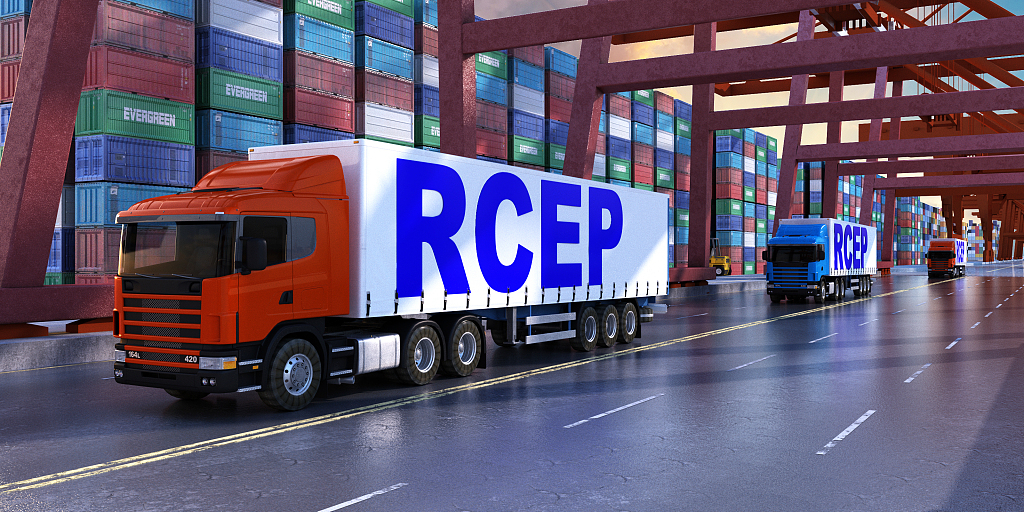What does RCEP Mean for Northeast Asia's Future?

RCEP has played a big role in promoting economic and trade relations among all member countries. (PHOTO: VCG)
By Hao Nan
The recently concluded series of summits for East Asian regional and global cooperation injected fresh impetus into the regional prospect for peace and prosperity. The ASEAN-led process in Cambodia, G20 Summit in Indonesia and APEC Summit in Thailand, are all sequential occasions that demanded leaders to come face-to-face to exchange views and concerns. It turns out that as long as the existing regional and global cooperation mechanisms are functional, one can be assured of the momentum of cooperation to be maintained.
The Regional Comprehensive Economic Partnership (RCEP), becoming effective in January, is one such regional cooperation mechanism in point. Having emerged as the largest free trade agreement in the world, covering 27 percent of world trade volume, RCEP promised a bright future for 10 ASEAN members and its five dialogue partners, namely China, Japan, Republic of Korea (ROK), Australia and New Zealand. Within the next two decades, it would reduce about 90 percent of the tariffs on imports among its signatories.
From a northeast Asian perspective, one unique contribution of the RCEP to the region is that for the first time it incorporates China, Japan and ROK, the three regional economic powers of global weight, into a single regional free trade agreement. The three countries combined, account for 25.5 percent of global GDP. The RCEP marks both the three countries' significant integration with the ASEAN region, and the deepening of the three countries' own trilateral cooperation.
In the last three quarters since the establishment of the RCEP, China's foreign trade with RCEP members reached 1.33 trillion USD with a year-on-year growth rate of 19.3 percent, accounting for 31.1 percent of its total foreign trade. Meanwhile the ROK reached 16.02 million USD with a year-on-year growth rate of 17.9 percent, making up 47.87 percent of the country's total foreign trade volume. Japan reached 59.46 million USD with a year-on-year growth rate of 10.5 percent, sharing 47.85 percent of its total foreign trade volume.
A mega-trade arrangement like RCEP is obviously not limited within the frame of trade. It is firstly a common platform for the entire region, especially the three powers mentioned to address issues of common interests and concerns. In today's context of strategic competition, surging nationalism and regional disturbances, the RCEP is especially valued for bonding the regional stakeholders for practical exchanges and cooperation, considering that the China-Japan-ROK trilateral free trade agreement would not materialize any time soon.
Even though the Biden Administration is rolling out the Indo-Pacific Economic Framework (IPEF), such an executive order and non-trade facilitating regional initiative simply makes the RCEP more attractive and practical in terms of serving regional cooperation and prosperity.
It is true that the RCEP does not focus on labor, human rights, and environmental sustainability issues, and hence might not be on par with Comprehensive and Progressive Agreement for Trans-Pacific Partnership (CPTPP).
However, the RCEP is not a once off project. The newly inaugurated RCEP ministers' meeting and the recently concluded ASEAN Plus Summits have already started to discuss the establishment of a permanent secretariat and other necessary institutions. Such intention of institutionalization of the RCEP would give opportunities to potential upgrading of the RCEP, and ultimately enable the countries to go beyond trade to more diverse issues, for example, supply chain security, standardization, and climate action.
The birth of RCEP in the context of rise of protectionism and nationalism was once acclaimed as a major step forward for the region and a sign of support for free trade and economic interdependence. And now, we are seeing that step is getting us on the right track.
Hao Nan is a Youth Fellow at Center for International Security and Strategy, Tsinghua University.


